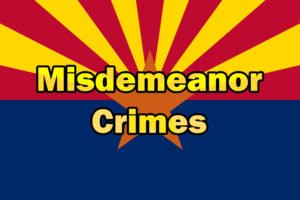In Arizona, misdemeanors are a category of criminal offense. They are more severe than petty offenses, but less severe than felonies. There are 3 classes of misdemeanors, though none of them carry longer than 6 months in jail and 3 years of probation. Convictions also come with fines and other collateral consequences.

Arizona has three classes of misdemeanor crimes
1. What misdemeanor classifications are there in Arizona?
There are 3 Classes of misdemeanors in Arizona:
Class 1 misdemeanors are the most severe type of misdemeanor in Arizona’s criminal law. While they are the most serious type of misdemeanor, Class 1 offenses are less severe than a felony.
Class 3 misdemeanors are the least severe. However, they are still more serious than a petty offense.
The criminal statutes that make certain courses of conduct illegal will designate a class of offense for the crime. If an Arizona law says that certain conduct is a misdemeanor without saying which class it is, then it is treated as a Class 2 misdemeanor.[2] If a state law makes something illegal and lays out the penalties for a violation, but does not classify the offense, then the penalties outlined in the law will apply.[3]

Petty theft is a misdemeanor in Arizona.
2. What are the potential penalties for an Arizona misdemeanor?
The penalties for a conviction for an Arizona misdemeanor include:
- fines,
- jail time, and
These penalties depend on the class of misdemeanor. For first-time offenders, the maximum penalties for each class are[4]:
| Fines | Jail time | Probation | |
| Class 1 misdemeanor | $2,500 | 6 months | 3 years |
| Class 2 misdemeanor | $750 | 4 months | 2 years |
| Class 3 misdemeanor | $500 | 1 month | 1 year |
These penalties increase if the defendant has a prior conviction for the same offense within the previous 2 years. Defendants who have a prior conviction will face penalties for offenses that are 1 class higher than their criminal offense.[5]
For example: A conviction for a second Class 3 misdemeanor in 2 years will be punished like a Class 2 misdemeanor. A conviction for a second Class 1 misdemeanor in 2 years will be punished like a Class 6 felony.
The fines are subject to surcharges that can increase the amount owed.[6] If the misdemeanor conviction was for a drug offense, the court can order additional fines.[7] These fines may be reduced if the defendant can show that paying them would create a financial hardship for themselves or for their family.[8]
The jail time is spent in county jail, rather than state prison. Judges can suspend the jail sentence and impose misdemeanor probation, instead. If the misdemeanor conviction was for personal drug possession or the possession of drug paraphernalia, then probation is required.[9]
Judges can also impose other penalties for a misdemeanor violation, including:
- community service,
- restitution,
- license suspensions, when the offense involved driving a vehicle,
- treatment or counseling, often for drug offenses,
- work release,
- home detention, and
- mandatory education classes.
There are also collateral consequences of a misdemeanor conviction. These are penalties that come from having a blemish on your criminal background. Some of them are:
- increased car insurance, for offenses involving a motor vehicle,
- difficulties getting a job with a criminal record,
- child custody complications,
- immigration repercussions, and
- professional licensing restrictions or penalties.
While the collateral consequences of a felony-level conviction are much higher, those that come from a misdemeanor offense are not trivial. Having a skilled criminal defense lawyer is essential for navigating these long-term consequences of a conviction.
3. What are some examples of misdemeanors?
Examples of misdemeanors in Arizona include:
- driving under the influence (DUI/DWI),
- certain domestic violence offenses,
- shoplifting,
- criminal damage of property valued at less than $250,
- disorderly conduct,
- drug possession,
- reckless driving, and
- driving on a suspended license.
4. How are misdemeanors different from other types of crime?
All types of misdemeanor crimes are less severe than felony offenses, but more severe than petty offenses. As a result, the penalties for misdemeanors are lower than they would be for felony offenses, but higher than they would be for petty offenses.

DUI is usually a misdemeanor in Arizona.
5. How long do prosecutors have to file charges?
Arizona prosecutors have a statute of limitations of 1 year to file most misdemeanor charges.[10] However, if the criminal charges come from a misdemeanor offense stemming from a car accident that seriously hurt or killed someone, then the applicable criminal statute of limitations is 2 years.[11]
If the prosecutor fails to abide by this time frame, an attorney from a criminal defense law firm can raise the statute of limitations as a defense. If successful, the court will dismiss the charges.
6. What is the court process?
Many people accused of a misdemeanor have never been in the criminal justice system, before, and do not know what to expect. Following an arrest, the steps that follow are:
- the initial appearance, also known as the arraignment, where the defendant enters his or her initial plea,
- the pretrial conference, where the prosecutor provides a copy of the report by the police officer and may offer a plea deal,
- evidence gathering by both the prosecutor and the criminal defense attorney’s law office,
- a change of plea hearing and sentencing, if the defendant decides to accept the plea deal, and
- the bench or jury trial.
If the trial ends with a conviction, the process continues to a sentencing hearing. If the defendant is acquitted at trial, the criminal process ends.
[1] ARS 13-601(B).
[2] ARS 13-602(B).
[3] ARS 13-602.
[4] ARS 13-707, 13-802, and 13-902.
[5] ARS 13-707(B).
[6] ARS 12-116.01 and 12-116.02.
[7] ARS 13-821.
[8] ARS 13-825.
[9] ARS 13-901.01.
[10] ARS 13-107(B)(2).
[11] ARS 28-672(H).
